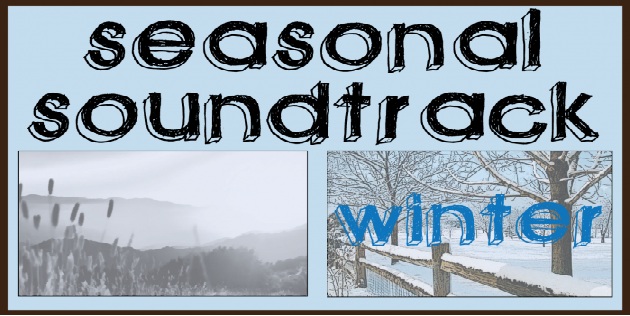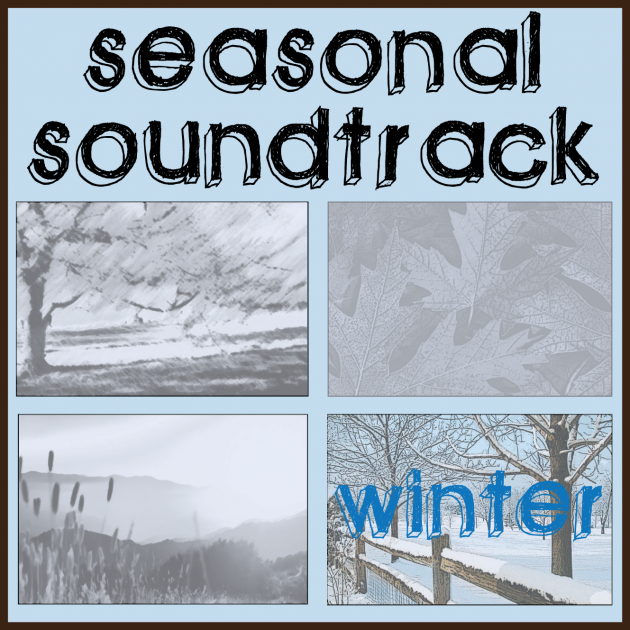
Most of these albums are contained within this: Our Seasonal Soundtrack: Winter Spotify playlist.

Public Image Ltd.
Flowers of Romance
[Virgin; 1981]
Flowers of Romance was arguably the most influential, adventurous piece of Public Image Ltd’s discography, but would anyone ever deem it wintry? It has such a warm analog sound, after all. That warmth could be attributed to John Lydon (formerly of the Sex Pistols) becoming increasingly influenced by the richness of krautrock and Kate Bush, but there is a noticeable chilliness to the record as well. Flowers is a prime candidate for a winter album, considering the starkness of the arrangements and Lydon’s slightly sociopathic affectations. You practically hear Lydon running away from all the overzealous Sex Pistols fans that demanded more raucous punk. “What do you want? You’re irritating, go away, its not my fault / That you’re lonely,” Lydon snarls to his fans in “Banging the Door.” In addition to the confrontational lyrics, Lydon’s cynicism manifests itself via experimentation with styles contrary to radio-friendly punk — imam-style singing, tribal drums, atonal ‘score’ music, early English folk music, and more. Flowers might have been reactionary and obstinate to the core, but its cold bitterness makes for a compelling listen.
– Arika Dean
Recommended listening:
“Banging The Door”
“Flower of Romance”
Click here to listen to Flowers of Romance on Spotify.

Sigur Rós
Ágætis Byrjun
[Fat Cat; 1999]
Face it. This winter soundtrack wouldn’t be complete without the inclusion of Sigur Rós. Just the fact that they’re from Iceland would automatically associate them with the winter season. Whether or not you enjoy the clever word play, you can’t deny that feel a certain chill crawls throughout your body when listening to Sigur Rós. Ágætis Byrjun is their landmark album where they began to introduce new dynamics in their music and received critical acclaim for it. Jónsi’s use of a cello bow to play his guitar created ambient soundscapes while incorporating lush and sweeping orchestral elements made the songs sound vastly expansive (or ‘glacial’ in a sense). And Jónsi’s pitch-perfect falsetto is so glistening that it’s like the musical equivalent to an aurora borealis. All of this results in an album so mind-blowing and beautiful that, if you were ever caught in a snow storm, listening to Ágætis Byrjun would definitely provide a source of hope.
– Ace Ubas
Recommended listening:
“Svefn-g-englar”
“Ný batterí”
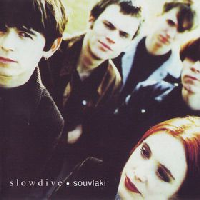
Slowdive
Soulvaki
[Creation; 1993]
Souvlaki has dual purposes as a winter album for me. In some senses, it represents the harsh alienation that winter itself brings. Tracks like “Dagger” and “Souvlaki Space Station,” though widely differing in their actual sound, both could accompany well the swirling winds and building loneliness that often accompanies the long winter months. Other tracks, however, counteract this alienated sound. If “Dagger” is the aural equivalent of a depressing cry for help in the midst of the depths of winter then tracks like “Alison” and “When The Sun Hits” are a warm pair of arms to run to. That’s not to say that these tracks are sunny by any means, they envelop you in a way that’s comforting, in a way that doesn’t necessarily leave you wishing for warmer days. There’s bits on this album that will tear you to pieces, but the majority of it is a refuge from the biting conditions outdoors. This is an album to wrap yourself up in during the long months ahead.
– Colin Joyce
Recommended listening:
“Alison”
“Dagger”
Click here to listen to Souvlaki on Spotify.
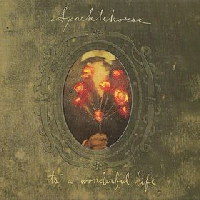
Sparklehorse
It’s a Wonderful Like
[Capitol/EMI; 2001]
Mapping the seasons onto periods of life is pretty simple in my mind: spring, summer and fall represent birth, life and death respectively. Winter is a little more tricky and seems to encapsulate both the very beginnings and very endings of things, which is exactly what Mark Linkous does so beautifully on It’s A Wonderful Life. On the one hand he celebrates new life on “Gold Day,” but on the very next track, “Piano Fire,” he seems to be coming to the end of life complaining of “solid marble eyes” and a “rusted metal heart.” For the most part, when left to his own devices, Linkous plays up the somber tone of It’s A Wonderful Life by embellishing with plenty of violins and piano. These slow tracks like the title track and “Eyepennies” really seem to encapsulate the blustery nature of the season. However, when accompanied by other musicians he amps things up a little as on the relatively raucous “Piano Fire” which features PJ Harvey, and the truly bizarre, Tom Waits-assisted “Dog Door.” Overall, It’s A Wonderful Life is arguably Linkous’ most reflective album, which matches winter which is a time of year in which we often take the opportunity to look at ourselves and our lives and try to make adjustments for the better. Just one more reason why this album should be in your headphones this winter.
– Rob Hakimian
Recommended listening:
“Gold Day”
“Eyepennies”
Click here to listen to It’s A Wonderful Life on Spotify.
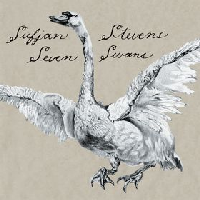
Sufjan Stevens
Seven Swans
[Sounds Familyre; 2004]
While you can almost describe Sufjan Stevens as a winter artist (Greetings From Michigan seems an equal fit here), both the musical tones and the religious themes make Seven Swans a fitting winter listen. After-all, this is the season of Christmas and Lent, a time where the moderately religious put a little more thought into their faith than usual. And though the Christian aspects of Seven Swans are undeniable, the arrangements, with the choral march of “All the Trees of the Field Will Clap Their Hands” and moment-of-truth sleigh ride of “In The Devil’s Territory” combine the banjo, the bells, the strings, and Sufjan’s voice to create music that is very solitary in its appeal, working as both an ode to the winter season and a reminder that the plants and animals and sun will all be returning shortly. But, mostly it’s the way the perfect “To Be Alone With You,” allows Sufjan to whisper his lyrics to us, and you can almost feel his smokey breath on your own ears.
– Philip Cosores
Recommended listening:
“To Be Alone With You”
“Seven Swans”
Click here to listen to Seven Swans on Spotify.
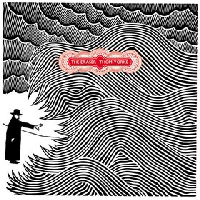
Thom Yorke
The Eraser
[XL; 2006]
The Eraser might as well be looked at as another Radiohead record. In other words, arguments concerning the album’s legitimacy as a soloistic work (compared to the band’s bonafide “masterpieces”) will forever tarnish it as a less-than-noteworthy accomplishment. In reality, The Eraser deserves much more attention than that. Here’s one of the most gifted songwriters of our generation creating his own idiosyncratic identity with a noticeably simpler set-up and lyrical perspective. Like other works created by newborn solo-artists, it offers an introspective look into a man conflicted by everyday struggles — very much relatable to the average human being. It’s also a surprising record that reveals Thom Yorke in different layers — particularly as someone who isn’t afraid of talking about “love” or “heartbreak.” These are qualities that, not only foreshadowed the surprising intimacy of In Rainbows in 2007, but also qualities that might have bewilderd Radiohead’s enthusiasts upon its release. Go ahead, call me crazy. But you’ll be hard pressed not to admit that Yorke’s lyrics on the album’s eponymous track cuts to the very core of what it takes to be human. It’s perfectly suited for Winter — a season commonly associated with death and heartbreak.
– Ryan Studer
Recommended listening:
“The Eraser”
“Atoms For Peace”
Click here to listen to The Eraser on Spotify.
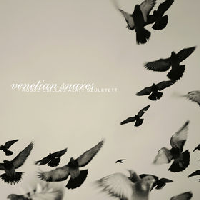
Venetian Snares
Rossz Csillag Allat Született
[Planet Mu; 2005]
If you’re looking for a dark, brooding album to take in the season, look no further than Venetian Snares’ Rossz Csillag Allat Született. That’s Hungarian for “Born Under A Bad Star.”
Aaron Funk, the mastermind behind Venetian Snares, gained inspiration for the album during a trip to Hungary. This becomes apparent in the samples of classical string and piano music that separate Rossz Csillag Allat Született from run-of-the-mill drum and bass albums. Hungarian composer Béla Bartók is frequently sampled. The only vocals on the album can be found on “Öngyilkos Vasárnap” (Suicidal Sunday) and are sampled from the Billie Holiday song “Gloomy Sunday.” It was originally written by Hungarian composer Rezso Seress and has come to be known as the Hungarian suicide song, due to an urban legend about suicides being committed while “Gloomy Sunday” played. To add on an extra layer to the grisly history that hangs over the song, Seress committed suicide.
“Öngyilkos Vasárnap” is only the third track on the album, but it sets a standard for the rest of Rossz Csillag Allat Született. Beautiful, melancholic string movements are combined with harsh, violent drumbeats to create a truly unique piece of electronic music. The nearly eight-minute track “Hajnal” (Dawn) features a continuous build of strings and jazzy instrumentation until Funk finally drops in a maelstrom of snares, kicks and cymbals. “Második Galamb” (Second Pigeon) is a steady stream of beats and samples that create a full-bodied track.
To some, drum and bass might appear to be nothing more than the byproduct of mashing the pads and buttons on a drum machine. But most music in this category is carefully composed, and Funk demonstrates his capability as a modern composer with this album.
– Nicholas Preciado
Recommended listening:
“Öngyilkos Vasárnap”
“Hajnal”

The xx
xx
[Young Turks; 2009]
There’s an undeniable coolness to The xx’s Romy Croft and Oliver Sim. On their debut record (almost three years old), they formulated an inseparable bond consisting of hushed vocals and minimalist instrumentation (not to mention Jamie Smith’s restrained production). As a collection of songs based on the idea of two lovers confessing their deepest and most intimate thoughts, it also provided an unconventional lyrical structure that was at times moving, and at others, heartbreaking. Listening to the record last December, I couldn’t help but feel that the band’s reiteration of space and reverb perfectly complemented the season’s desolate imagery (think winter snow). Jamie Smith’s production also provided an understated soundtrack to the singers’ back-and-forth conversations — resulting in a hauntingly beautiful atmosphere was just as cold as it was romantic.
– Ryan Studer
Recommended listening:
“Islands”
“Shelter”
Click here to listen to xx on Spotify.

Yeah Yeah Yeahs
It’s Blitz!
[Interscope; 2009]
If you’ve ever been to Wales, specifically the south-western corner in winter, you’ll know that a typical winter doesn’t really exist. Year upon year of rain, grey skies, more rain, a gusty wind and more rain. In 2009 something weird happened: It snowed. Heaps of the stuff. Three weekends out of four (unfortunately, the other weekend when it didn’t was Christmas Day) I was treated to blizzards, icy cold weather, bright but freezing sunshine and then more blizzards. The snow didn’t clear for a month! It was around this time I’d bought It’s Blitz! for cheap as a last-gasp effort to get into it. As it turns out it was all I listened to that winter, and has slowly become THE winter soundtrack for me.
When you listen to it, It’s Blitz! doesn’t resemble a winter album at all, but for me, there’s so much tied up into it that every time I give it a spin I’m transported back to the cold and the snow and the ice. And every time I do listen to it I start to think that it is actually a perfect winter album because of the juxtaposition. The synths are so warm-sounding, and given how prominent they are it’s almost like having a blanket thrown over you with every listen. Karen O is so full of energy on every track, that very energy being so infectious it lifts you up regardless of the weather and temperature.
During wintertime, putting on It’s Blitz! is like putting the fire on really high, except it’s only my ears that really benefit from it, and I love that.
– Daniel Griffiths
Recommended listening:
“Soft Shock”
“Dull Life”
Click here to listen to It’s Blitz! on Spotify.
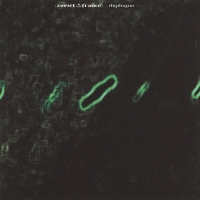
Zoviet France
Digilogue
[Soleilmoon Recordings; 1996]
One of my picks for our Fall Seasonal Soundtrack was Demdike Stare’s Tryptych. Zoviet France treads the same hollowed ground as the contemporary English dark ambient duo (their similarity can honestly be pretty striking at times), but with all the human traces stripped away. Zoviet France are a hard sell for any season local to Earth, especially regarding the music found on Digilogue, as they more readily inhabit the coldness and alienness of black space. Digilogue opens with “Alchemagenta,” a malevolent rhythmic fifteen minute industrial droner punctuated by mechanical arpeggios like distant dystopic police sirens. From there it burrows toward darker shades of black employing ghostly choir samples, tribal rhythms, and mechanized sub-octaves. Zoviet France have a pretty lengthy and consistent back catalog spanning from the early 80s to the present, but this 1995 record is as good a place to start as any. You’ll know within the first few seconds whether you’re on board or not.
– Will Ryan

